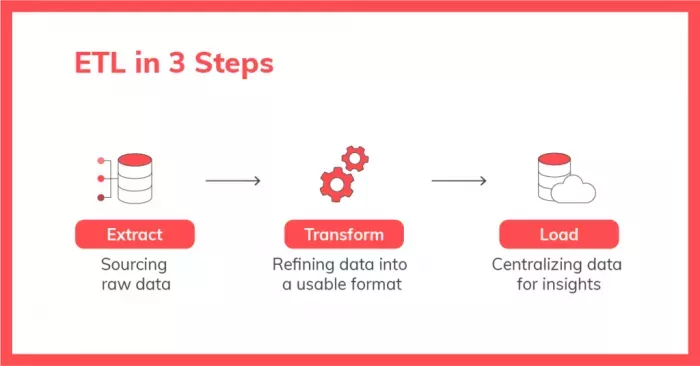Technology
5 min read
Turn Data into Gold: The AI Strategies That Boost Efficiency and Revenue


Modern company success rests on data. Every interaction, deal, and customer involvement offers insightful information. Still, raw data has practically no value. It remains a resource not used until proper techniques and instruments are available.
Artificial intelligence (AI) is altering the way companies treat data. With AI-powered solutions, businesses can get insightful insights, improve operations, and fuel revenue growth. Those who adopt data-driven approaches powered by artificial intelligence have a major competitive edge.
From automating data management using ETL to boosting decision-making, customizing consumer experiences, and strengthening security, artificial intelligence unleashes the real potential of data by means of the major AI techniques that convert data into useful knowledge.
Although data is sometimes referred to as the "new oil," its worth depends on how well it is processed and used. Though many companies across several sectors create enormous volumes of data every day, many find it difficult to properly organize and evaluate it. Major obstructions result from poor data quality, dispersed information systems, and slow processing times.
Through data collecting, cleaning, and analysis simplification, artificial intelligence aids in overcoming these obstacles. Companies can make educated decisions, obtain real-time insights, and increase operational efficiency, thanks to AI-driven automation. Companies that don't use artificial intelligence risk falling behind; conversely, those that do clearly have a data-driven economy.

Gathering, processing, storing, and organizing data must come before it may be appropriately used and examined. ETL Extract, Transform, Load steps in here; ETL gathers data from several sources, formats, and cleans it, then loads it into a main database or data warehouse.
Manual processes and preset rules define conventional ETL techniques, which can be slow and prone to mistakes. By automating data extraction, intelligently transforming raw data, and guaranteeing smooth integration across systems, artificial intelligence improves ETL.
AI-powered ETL tools eliminate inefficiencies by automating complex tasks. Instead of relying on predefined rules, AI adapts and learns from data patterns, improving accuracy over time. With little human involvement, it can find and fix errors, eliminate duplicates, and combine data from many sources.
This means that for companies, quicker, more dependable data processing at scale, Real-time analytics made possible by AI-driven ETL enables companies to more effectively react to trends and market changes.
Beginning with well-ordered data, artificial intelligence carries analytics to the next level by discovering patterns, forecasting trends, and offering practical insights.
Using historical data, predictive analytics predicts future events. Businesses use artificial intelligence models to predict customer behavior, maximize inventory, and spot market trends before they materialize. Rather than responding to developments, businesses may actively modify plans to maximize results.
Prescriptive analytics goes a step further by suggesting specific actions. AI can suggest the best pricing strategy based on demand fluctuations, identify ideal marketing campaigns for customer segments, or optimize resource allocation. Companies that leverage AI-powered analytics make data-driven decisions faster and more accurately than ever.
AI transforms business operations by automating repetitive tasks, reducing costs, and improving efficiency. In many industries, robotic process automation (RPA) powered by AI, handles administrative work, financial transactions, and customer service requests with remarkable speed and precision.
AI chatbots and virtual assistants offer immediate responses in customer care, manage questions, process orders, and fix issues without human involvement. While lowering operating expenses, these AI-driven systems improve customer experience.
Supply chain management is also being transformed by artificial intelligence. Logistics businesses forecast demand, maximize routes, and minimize delivery delays using artificial intelligence. Inventory systems driven by artificial intelligence automatically change stock levels depending on sales data, therefore avoiding overstocking or shortages.
Automating crucial processes helps companies run more effectively, lowers mistakes, and frees staff members to concentrate on strategic projects instead of daily duties.
AI-driven personalizing is transforming the way companies engage with their consumers. Today's customers want customized experiences, and artificial intelligence makes large-scale delivery of these possible.
Artificial intelligence may examine client behavior to produce very focused marketing efforts that increase sales and involvement. While streaming services design customized content for subscribers, e-commerce sites use artificial intelligence to suggest items based on browsing history. These AI-powered suggestions increase conversion rates as well as improve consumer happiness.
Another AI-powered income-boosting approach is dynamic pricing, where airlines, hotels, and merchants change costs in real time depending on demand, rival pricing, and consumer behavior. AI maximizes profit without compromising customer loyalty by analyzing massive volumes of data to identify the best price point.
Companies that adopt artificial intelligence for personalization experience more revenue potential, greater brand loyalty, and higher customer retention.
With great volumes of data comes the responsibility to protect it. By spotting dangers, stopping fraud, and guaranteeing adherence to data rules, artificial intelligence (AI) is quite important in cybersecurity.
Real-time transactions are examined by AI-powered fraud detection systems, which spot suspicious behavior before it worsens. Banks and financial institutions use artificial intelligence to spot strange patterns that might point to fraudulent activity, hence avoiding financial losses.
Data privacy rules like GDPR and CCPA call for firms to handle personal information responsibly. AI helps to track compliance, find weaknesses, and automatically safeguard data protection procedures. By including AI into security precautions, companies may protect sensitive information while preserving customer trust.
Although only when utilized strategically, data is a valuable resource. AI-driven systems turn unprocessed data into insightful insights, enabling companies to boost sales, increase efficiency, and improve customer experiences.
From automating ETL processes to enabling more intelligent analytics, personalizing interactions, and optimizing operations, AI unlocks new business possibilities across sectors. Companies that embrace AI-driven approaches have a competitive advantage, while those that disregard it risk being left behind.
Data will drive business in the future; AI holds the secret to fully realized potential. Embrace artificial intelligence now and transform your data into gold.
Be the first to post comment!